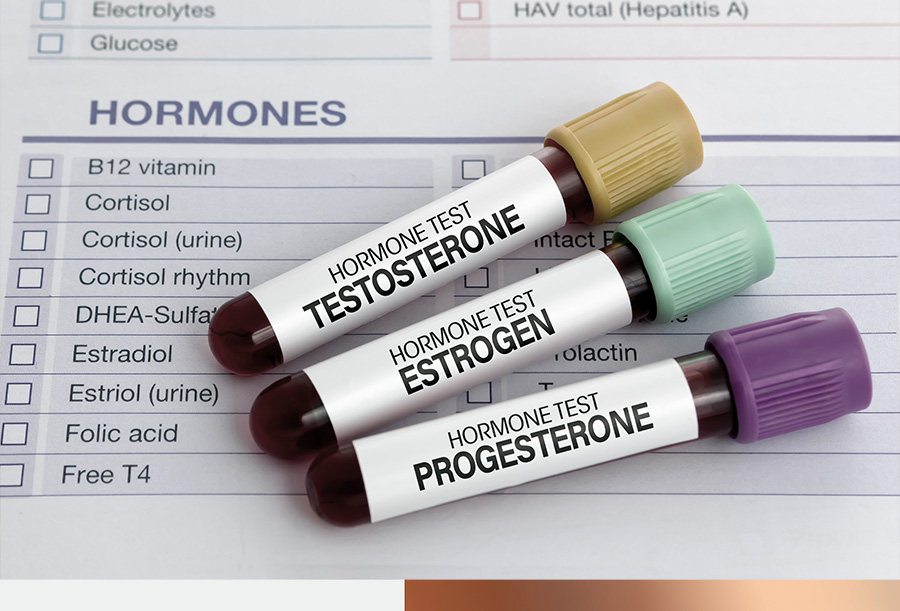Hormone Replacement Therapy (HRT) is a medically prescribed treatment designed to restore hormonal balance, particularly for women experiencing menopause or perimenopause. As the body ages, estrogen and progesterone levels naturally decline, often leading to uncomfortable symptoms such as hot flashes, mood swings, and fatigue. HRT replenishes these hormones, alleviating symptoms and significantly improving quality of life.

Beyond menopause, HRT can also be recommended for hormonal imbalances caused by other conditions, ensuring a broader application for women seeking relief and balance.
What happens in HRT?
Hormone Replacement Therapy or HRT focuses on addressing the physical and emotional challenges of hormonal decline by:
- Relieving Menopausal Symptoms: Reducing hot flashes, night sweats, mood changes, and vaginal dryness.
- Protecting Bone Health: Preventing osteoporosis by strengthening bone density, especially post-menopause.
- Improving Overall Well-being: Enhancing mood, energy, and quality of life for women at various life stages.
How Hormone Replacement Therapy Works
HRT supplements the body with hormones to restore balance, mimicking the natural processes that decline during menopause. There are three primary types of HRT tailored to individual needs:
Benefits of Using HRT

- Relief from Menopausal Symptoms: HRT is the most effective treatment for hot flashes, night sweats, mood swings, and vaginal dryness. It provides immediate comfort, helping women regain their sense of normalcy during menopause.
- Improved Bone Health: Estrogen plays a critical role in maintaining bone density. HRT reduces the risk of osteoporosis and fractures, ensuring long-term strength and mobility.
- Enhanced Emotional Well-being: Hormonal imbalances often lead to irritability, anxiety, or depression. HRT stabilizes mood swings and promotes mental clarity, giving women emotional stability.
- Better Sleep Quality: Many menopausal women suffer from insomnia or disrupted sleep. By alleviating night sweats and anxiety, HRT supports restorative, uninterrupted sleep.
- Increased Energy and Vitality: With balanced hormones, women often report feeling more energetic and vibrant, reclaiming the stamina needed to enjoy life fully.
- Enhanced Emotional Sexual Health and Intimacy: Vaginal dryness and reduced libido are common symptoms of hormonal decline. HRT rejuvenates sexual health, restoring comfort and intimacy in relationships.

Who Is Hormone Replacement Therapy For?
Hormone Replacement Therapy is designed for women experiencing the effects of hormonal decline. Here’s a quick guide to see if it’s right for you:
- Women Experiencing Menopause or Perimenopause
- Common symptoms include hot flashes, night sweats, mood swings, and reduced energy.
- HRT helps ease the transition and makes menopause manageable.
- Individuals with Premature Menopause or Ovarian Insufficiency
- Women under 40 experiencing menopause due to genetics or surgery often benefit from HRT.
- It’s crucial for protecting their long-term health, including bone and heart health.
- Women at Risk for Osteoporosis
- If you have a family history of osteoporosis or have experienced fractures, HRT can be a proactive step in maintaining strong bones.
- Those Struggling with Vaginal or Sexual Health
- HRT addresses vaginal dryness, discomfort during intimacy, and hormonal changes affecting libido.
How to Get Started with HRT
Embarking on your HRT journey is a straightforward process with professional guidance. Here’s what you can expect:
- Schedule Your Consultation
- Begin by consulting with a qualified healthcare provider to discuss your symptoms, health history, and personal goals.
- This step ensures that HRT is a safe and appropriate option for your needs.
- Comprehensive Evaluation
- Your provider will assess your hormone levels through blood tests and review any existing medical conditions.
- They will consider factors such as age, family history, and risk factors to recommend the best course of action.
- Personalized Treatment Plan
- Based on your evaluation, your provider will create a tailored HRT regimen. This may include selecting the right type of hormones (e.g., estrogen-only or combined) and the preferred method of delivery (e.g., patches, gels, or implants).
- Regular Monitoring and Adjustments
- Follow-up appointments will ensure your therapy is effective and fine-tuned to your body’s response.
- Your provider will monitor for potential side effects and adjust your plan as needed.
- Take Control of Your Well-Being
- HRT is more than a treatment; it’s an opportunity to reclaim your vitality and enjoy life without the discomfort of hormonal imbalances.









